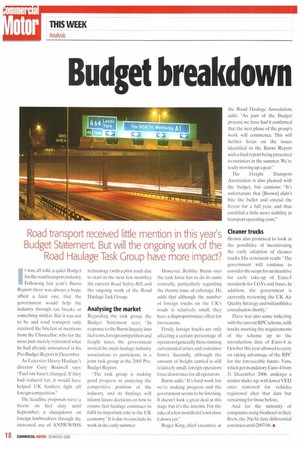Budget breakdown
Page 18

If you've noticed an error in this article please click here to report it so we can fix it.
Road transport received little mention in this year's Cleaner trucks Brown also promised to look at Budget Statement. But will the ongoing work of the
Road Haulage Task Group have more impact?
It was, all told, a quiet Budget for the road transport industry. . Following last year's Burns Report there was always a hope, albeit a faint one, that the government would help the industry through tax breaks or something similar. But it was not to be and road transport only received the briefest of mentions from the Chancellor, who for the most part merely reiterated what he had already announced in his Pre-Budget Report in December.
As Leicester Heavy Haulage's director Gary Rodwell says: "Fuel tax hasn't changed. If they had reduced tax, it would have helped UK hauliers fight off foreign competition," Ile headline proposals were: a freeze on fuel duty until September; a clampdown on foreign lawbreakers through the increased use of ANPR/WINIS technology (with a pilot study due to start in the next few months); the current Road Safety Bill, and the ongoing work of the Road Haulage Task Group.
Analysing the market
Regarding the task group, the Budget Statement says: "In response to the Burns Inquiry into fuel costs, foreign competition and freight taxes, the government invited the main haulage industry associations to participate in a joint task group at the 2005 PreBudget Report.
"The task group is making good progress in analysing the competitive position of the industry, and its findings will inform future decisions on how to ensure that haulage continues to fulfil its important role in the UK economy." It is due to conclude its work in the early summer. However, Robbie Burns says the task force has to do its sums conectly, particularly regarding the thorny issue of cabotage. He adds that although the number of foreign trucks on the UK's roads is relatively small, they have a disproportionate effect for two reasons Firstly, foreign trucks are only affecting a certain percentage of operators (generally those running curtainsided artics and container firms). Secondly, although the amount of freight carried is still relatively small, foreign operators force down rates for all operators.
Burns adds: "It's hard work but we're making progress and the government seems to be listening. It doesn't look a great deal at this stage but it's the interim. For the sake of a few months let's not close it down yet."
Roger King, chief executive at the Road Haulage Association, adds: "As part of the Budget process, we have had it confirmed that the next phase of the group's work will commence. This will further focus on the issues identified in the Burns Report with a final report being presented to ministers in the summer. We're really moving up a gear.
The Freight Transport Association is also pleased with the budget, but cautions: "It's unfortunate that [Brown] didn't bite the bullet and extend the freeze for a full year, and thus establish a little more stability in transport operating costs."
the possibility of incentivising the early adoption of cleaner trucks. His statement reads: "The government will continue to consider the scope for an incentive for early take-up of Euro-5 standards for LGVs and buses. In addition, the government is currently reviewing the UK Air Quality Strategy and will publish a consultation shortly."
There was also some tinkering with the current RPC scheme, with trucks meeting the requirements of the scheme up to the introduction date of Euro-4 in October this year allowed to carry on taking advantage of the RPC for the foreseeable future. Vans, which get mandatory Euro-4 from 31 December 2006, undergo a similar shake-up, with lower VED rates removed for vehicles registered after that date but remaining for those before.
And for the minority of companies using biodiesel in their fleets, the 20p/lit duty differential continues until 2007/08. •






























































































































































































